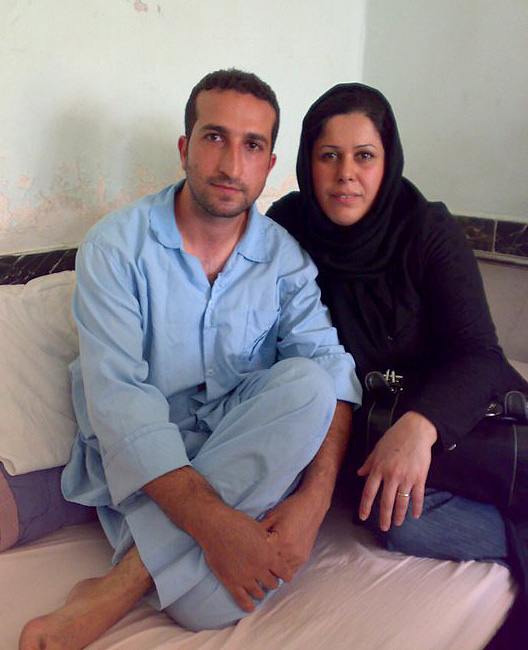
Pastor Yousef Nadarkhani is currently on death row in Iran for the “crime” of converting to Christianity from Islam. The charges of his initial arrest in 2009 were for protesting, which were later changed to apostasy and evangelism. In Sept. 2010, an Iranian court verbally delivered a death sentence, which was then delivered in writing a month later by the 1st Court of the Revolutionary Tribunal. After submitting an appeal to the Supreme Court the very next month, the third chamber of the Supreme Court upheld his conviction and death sentence in June 2011 and the execution orders were given in Feb. 2012, which can be implemented at any time. Throughout the process, he was told his life would be spared if he recanted his belief in Christianity, which he refused to do.
This verdict clearly violates numerous human rights, which is why President Obama, the U.S. Commission on International Religious Freedom, Amnesty International and the American Center for Law and Justice have all condemned this conviction and called for Nadarkhani’s release.
As a Muslim, however, I find this verdict’s religious violations equally troublesome. Far too many people — Muslim and non-Muslim — mistakenly believe Islam prohibits freedom of conscience and religion by prescribing punishments for matters like apostasy and blasphemy, whereas Islam’s Holy Scripture and Prophet do not support such punishments.
If Islam prescribed any earthly punishment for leaving the faith, it would mean that it compels one to be Muslim against their will. But chapter two of the Quran — Islam’s Holy Scripture –rejects this notion, stating, “there shall be no compulsion in religion.”
There are at least 10 direct verses in the Quran about those who leave Islam, none of which sanction death in response. Exemplifying the Quran’s principles, the Prophet Muhammad never ordered any person to be killed for apostasy. In his peace treaty with Meccans, he agreed that any Muslim recanting their faith would be allowed to return to Mecca unharmed. Muhammad’s acceptance of this condition demonstrates that no such punishment exists for apostasy, as he would never accept anything that went against the Shariah.
Yet some within the Muslim world argue these verses only apply to non-Muslims, whereas Muslims can be compelled in matters of religion. They cite examples during the lifetime of Prophet Muhammad when Ibn Khatal, Musailmah and Maqees bin Sababah were put to death. These were not religious punishments for apostasy, however. They were political punishments for murders each individual had committed.
Death for apostasy had its birth several decades after the demise of Prophet Muhammad — in an age when use of force for spreading influence and ideology was common around the world. The Ummayyad dynasty (661-750) — the political rulers of the Muslim empire — were regarded as secular kings and did not have the religious position of the previous pious caliphs. To guard the Sharia, the kings appointed clergy to positions much like the clergy after Constantine’s conversion. Respected for their religious knowledge, their support was pursued to legitimize unpopular political regimes.
Political and social rebellions then became justified in religious expressions, and dynastic power struggles developed significant disagreements in religious doctrine. Thus began politically motivated punishments (including executions and crucifixions) aimed at abolishing any forms of objection.
While this view finds no credibility from Prophet Muhammad’s example, it has admittedly become more prevalent in the last century. For example, Abul Ala Maududi, influential cleric and founder of the Pakistani political party Jamaat Islami, advocated this erroneous view beginning in the 1930s. He wrote, “in our domain we neither allow any Muslim to change his religion nor allow any other religion to propagate its faith.”
Many believe Maududi’s view was reactionary and in response to the growing influence of Mirza Ghulam Ahmad — who claimed to be the second coming Jesus and Messiah for all people to remove misconceptions in religion, unite everyone under the banner of true Islam, and bring mankind back to God. Half a century before Maududi, Ahmad condemned any punishment for blasphemy or apostasy and any violence to spread faith. He wrote, “Religion is worth the name only so long as it is in consonance with reason. If it fails to satisfy that requisite, if it has to make up for its discomfiture in argument by handling the sword, it needs no other argument for its falsification. The sword it wields cuts its own throat before reaching others.”
Sadly, apostasy and other “crimes” like blasphemy are punishable offences in some Muslim-majority countries today, including Iran, Saudi Arabia, Afghanistan, Pakistan, Sudan, etc. In these countries, apostasy and blasphemy are not only leveled against non-Muslims but even people the country deems to be the wrong type of Muslims.
The good news, however, is that though certain regimes apply extremist penal codes under the guise of Islam, the majority of Muslims recognize that Islam condemns religious compulsion. For example, the Ahmadiyya Muslim Community — Muslims who believe in that Messiah, Mirza Ghulam Ahmad of Qadian — has advocated this position for over a century. In this continuing war of ideas, true success is through peace and logic — never violence.
Any attempt to compel Pastor Nadarkhani to recant his Christian faith is barbaric and against the teachings of the Quran. The government leaders in Iran who have sentenced Pastor Nadarkhani to death, do so of their own accord. Quran and Prophet Muhammad, however, are clear — Pastor Nadarkhani must be set free.
Originally posted in The Huffington Post on March 12, 2012.
